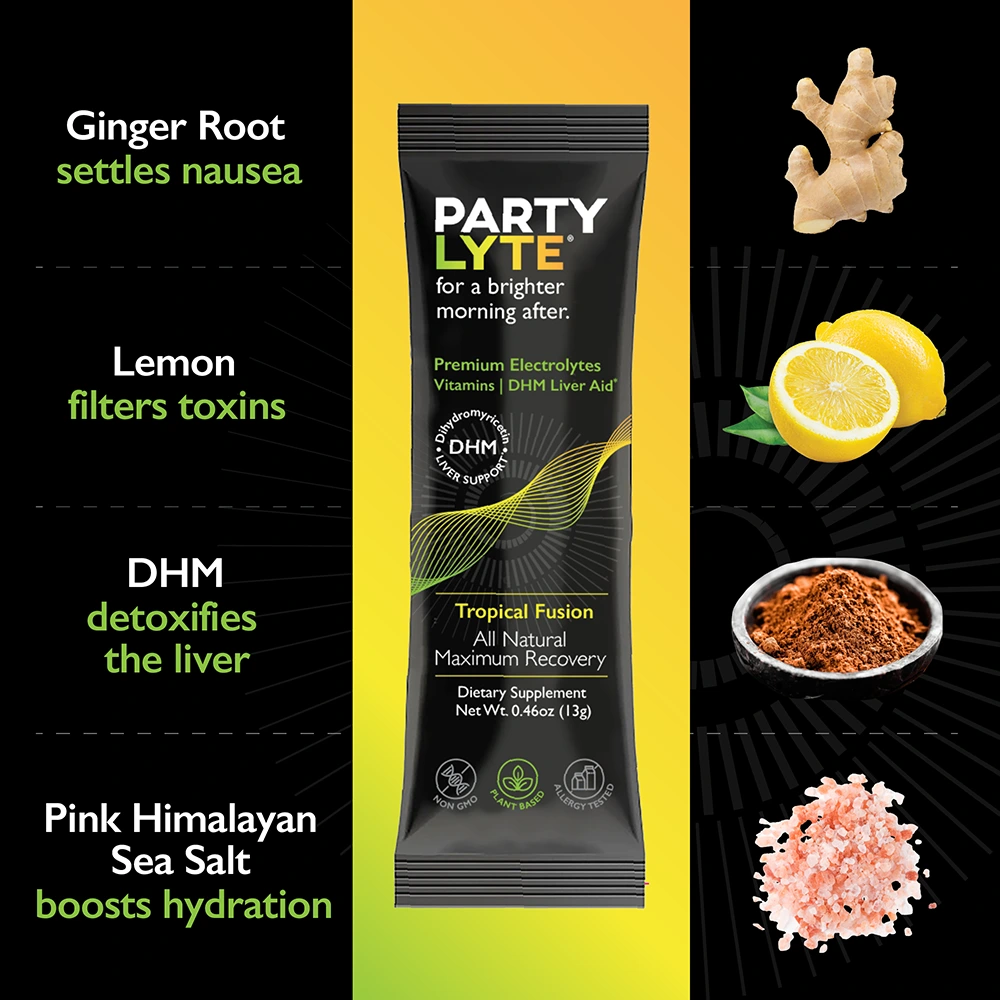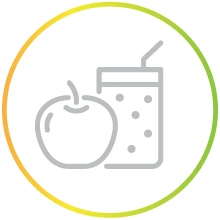
PartyLyte is much more than an electrolyte powder packet, it’s everything your body needs to bounce back, packed into one easy-to-use pouch.
Premium Ingredients – Backed by Science
PartyLyte is scientifically formulated for Party Recovery. Say goodbye to post-party blues and hello to feeling great, every time.

Refreshing Flavor
PartyLyte’s Tropical Fusion flavor is infused with hints of lemon and ginger. It’s not just a healthy supplement – it’s a natural way to stay hydrated. Your weekend supply kit is not complete without PartyLyte!

Natural Ingredients
Our meticulously crafted formula is 100% natural & vegan, keto-friendly, and non-GMO, ensuring you’re consuming only the purest ingredients.

All-in-one Party Aid
PartyLyte is the ultimate blend of electrolytes, vitamins, minerals, NAC and DHM: everything your body needs to bounce back after a night of partying.
“I rarely write reviews, but this is one of those products I want everyone to know about and try! As someone who prioritizes nutrition, it was amazing for me to find PartyLyte with no artificial colors, flavors or ingredients. To top it off, PartyLyte is a miracle product! I drank it towards the end of a business dinner that included several glasses of wine, and I couldn’t believe how well I felt the next day!” –Yuri
To help you stay informed, we have compiled the most common questions and answers around the quality and benefits of our ingredients and formula.
Do you have a question that is not answered below? Send a note to info@partylyte.com!
A small amount of sugar, combined with sodium (sodium-glucose co-transport) enables the body to absorb significantly more water in a much shorter period of time. This co-transport mechanism is especially important when consuming alcoholic beverages, dancing, etc.
Putting it in perspective, 6g of sugar is the equivalent to 12 grapes and typically not enough to knock you out of ketosis if you follow a Ketogenic diet. In fact, PartyLyte is in the process of receiving our “Keto Certified” seal of approval as 6g of carbs per serving is within the permissible range.
PartyLyte has gone through detailed Nutrition Analysis, 2 Year Stability Study, Heavy Metals Testing, Pesticide Residue Testing and European Pharmacopeial Pesticide Residue Testing. All to ensure the highest level of product safety and efficacy.
In addition, all our ingredients are sourced from premium distributors and our color and taste come from all natural sources. A night of fun might not be the best for your body, but you can rest assured knowing PartyLyte is the healthiest (and tastiest) drink you will consume before going to bed.
Electrolytes are essential minerals that help regulate fluid balance, muscle function, and nerve function in the body. They can be lost through sweating, urination, and other bodily functions, including drinking alcohol. When alcohol is consumed, it can lead to dehydration and electrolyte imbalances, which can contribute to hangover symptoms. Here are some ways in which electrolytes can help prevent hangovers:
Rehydration: Alcohol is a diuretic, which means that it increases urine output and can lead to dehydration. Electrolytes help to regulate fluid balance in the body and can help prevent dehydration by promoting water retention.
Restoring electrolyte balance: Drinking alcohol can lead to an electrolyte imbalance, which can cause symptoms such as muscle cramps, fatigue, and nausea. Electrolyte supplements can help restore the balance of these essential minerals in the body and reduce these symptoms.
Supporting liver function: Electrolytes are important for the proper function of the liver, which is responsible for processing alcohol in the body. By supporting liver function, electrolytes may help to reduce the amount of alcohol that is absorbed into the bloodstream, which can help prevent hangovers.
Overall, electrolytes can help prevent hangovers by promoting rehydration, restoring electrolyte balance, and supporting liver function. Electrolytes can be found in various foods and drinks, including sports drinks, coconut water, and bananas. It’s important to remember that the best way to prevent a hangover is to drink in moderation and stay hydrated while drinking.
B and C vitamins play important roles in the body’s metabolism and energy production, and they may also help reduce some of the symptoms of a hangover. Here are some ways in which B and C vitamins can help with hangover symptoms:
Boosting energy: Alcohol consumption can lead to fatigue and sluggishness due to its effect on the body’s energy metabolism. B vitamins, particularly vitamin B12 and folate, are essential for the production of energy in the body and can help boost energy levels and reduce fatigue.
Reducing inflammation: Alcohol consumption can lead to inflammation in the body, which can cause headache, muscle aches, and other symptoms. Vitamin C is a powerful antioxidant that can help reduce inflammation and oxidative stress caused by alcohol consumption.
Supporting liver function: The liver is responsible for processing alcohol in the body, and excessive alcohol consumption can put a strain on the liver. B vitamins, particularly vitamin B6 and B12, are essential for the proper function of the liver and can help support its detoxification processes.
Boosting immunity: Alcohol consumption can weaken the immune system, making the body more susceptible to infections and illnesses. Vitamin C is essential for the proper function of the immune system and can help boost immunity and reduce the risk of infections.
Overall, B and C vitamins may help reduce hangover symptoms by boosting energy, reducing inflammation, supporting liver function, and boosting immunity. However, it’s important to remember that the best way to prevent a hangover is to drink in moderation and stay hydrated while drinking.
What sources do you have that indicate DHM is effective at reducing hangover symptoms
Dihydromyricetin (DHM) is a flavonoid compound that is derived from the Japanese raisin tree, and it has been suggested to have potential benefits in reducing hangover symptoms. Here are some examples of research sources that have looked at the effects of DHM on hangovers:
Li et al. (2019) conducted a randomized, double-blind, placebo-controlled trial of 60 healthy adults who consumed alcohol to the point of intoxication. Participants were given either a placebo or 300mg of DHM before drinking and again the next morning. The study found that DHM significantly reduced symptoms of headache, dizziness, and fatigue compared to the placebo group.
Li et al. (2013) conducted a randomized, double-blind, placebo-controlled trial of 52 healthy adults who consumed alcohol to the point of intoxication. Participants were given either a placebo or 300mg of DHM before drinking and again the next morning. The study found that DHM significantly reduced symptoms of headache, dizziness, and nausea compared to the placebo group.
Wiese et al. (2016) conducted a literature review of studies on the effects of DHM on alcohol-induced liver injury and hangovers. The review found that DHM may have potential benefits in reducing hangover symptoms, although more research is needed to fully understand its effects.
Zhang et al. (2018) conducted a review of studies on the effects of DHM on alcohol-related disorders. The review found that DHM has antioxidant, anti-inflammatory, and neuroprotective effects that may help reduce hangover symptoms and protect against alcohol-induced damage.
While these studies suggest that DHM may have some benefits for reducing hangover symptoms, it’s worth noting that the evidence is limited and more research is needed to fully understand its effects. Additionally, it’s important to remember that the best way to prevent a hangover is to drink in moderation and stay hydrated while drinking.
There is some evidence to suggest that N-acetylcysteine (NAC) may be effective in reducing some of the symptoms of a hangover, although more research is needed to fully understand its effects.
NAC is a compound that is used to boost levels of glutathione, a powerful antioxidant in the body. It is often used to treat acetaminophen overdose and other liver conditions, as well as to support detoxification pathways in the body.
Some research has suggested that NAC may help reduce the severity of hangover symptoms, such as headache, nausea, and fatigue. This is thought to be due to its ability to help the liver process alcohol more efficiently and reduce inflammation caused by alcohol consumption.
However, the evidence on the effectiveness of NAC for reducing hangover symptoms is limited and conflicting. Some studies have found that NAC can reduce certain symptoms of a hangover, while others have found no significant effects.
It’s worth noting that while NAC may be effective in reducing some hangover symptoms, it’s not a cure for a hangover and should not be relied upon as a way to prevent or treat the negative effects of excessive alcohol consumption. The best way to prevent a hangover is to drink in moderation and stay hydrated while drinking.
What are some specific sources that indicate NAC is effective in reducing hangover?
While the evidence on the effectiveness of N-acetylcysteine (NAC) for reducing hangover symptoms is limited and conflicting, there are a few studies that have suggested that NAC may have some benefits. Here are some examples of research sources that have looked at the effects of NAC on hangovers:
Moradi et al. (2018) conducted a randomized, double-blind, placebo-controlled trial of 56 healthy adults who consumed alcohol to the point of intoxication. Participants were given either a placebo or 1200mg of NAC before drinking and again the next morning. The study found that NAC significantly reduced symptoms of nausea, headache, and diarrhea compared to the placebo group.
Zullino et al. (2009) conducted a double-blind, randomized, placebo-controlled trial of 20 healthy adults who consumed alcohol to the point of intoxication. Participants were given either a placebo or 1500mg of NAC before drinking and again the next morning. The study found that NAC reduced symptoms of headache and nausea compared to the placebo group.
Sechi et al. (2008) conducted a randomized, double-blind, placebo-controlled trial of 15 healthy adults who consumed alcohol to the point of intoxication. Participants were given either a placebo or 1200mg of NAC before drinking and again the next morning. The study found that NAC reduced symptoms of headache, nausea, and tiredness compared to the placebo group.
While these studies suggest that NAC may have some benefits for reducing hangover symptoms, it’s worth noting that the evidence is limited and conflicting, and more research is needed to fully understand its effects. Additionally, it’s important to remember that the best way to prevent a hangover is to drink in moderation and stay hydrated while drinking.
Ginger has been traditionally used as a natural remedy for nausea and vomiting, and it may also be effective in reducing some of the symptoms of a hangover. Here are some ways in which ginger may help with hangover symptoms:
Reducing nausea: One of the most common symptoms of a hangover is nausea, and ginger is known to have anti-nausea properties. It can help soothe the stomach and reduce feelings of queasiness and vomiting.
Reducing inflammation: Alcohol consumption can lead to inflammation in the body, which can cause headache, muscle aches, and other symptoms. Ginger contains compounds called gingerols and shogaols, which have anti-inflammatory properties that can help reduce inflammation in the body.
Improving digestion: Alcohol can disrupt the digestive system, leading to bloating, gas, and other digestive issues. Ginger can help improve digestion and reduce these symptoms by increasing the production of digestive enzymes and speeding up the movement of food through the digestive tract.
Boosting hydration: Hangovers are often caused by dehydration, and ginger can help boost hydration levels by increasing urine output and reducing fluid loss.
Overall, ginger may be effective in reducing some of the symptoms of a hangover, particularly nausea and inflammation. It can be consumed in various forms, including ginger tea, ginger ale, or as a supplement. However, it’s important to remember that ginger should not be relied upon as a cure for a hangover and that the best way to prevent a hangover is to drink in moderation and stay hydrated while drinking.
Lemon juice has been traditionally used as a natural remedy for various health conditions, including hangovers. Here are some ways in which lemon may help reduce hangover symptoms:
Rehydration: Lemon juice is a good source of water and electrolytes, such as potassium and magnesium, which can help prevent dehydration caused by alcohol consumption. Staying hydrated can help reduce hangover symptoms, such as headache, dry mouth, and fatigue.
Detoxification: The liver is responsible for processing alcohol in the body and eliminating toxins from the bloodstream. Lemon juice contains antioxidants, such as vitamin C, that can help support the liver’s detoxification processes and reduce the harmful effects of alcohol on the body.
Alkalization: Alcohol consumption can lead to acidosis, which is an imbalance in the body’s pH levels that can cause fatigue, headache, and other symptoms. Lemon juice is acidic in nature but has an alkalizing effect on the body, which can help restore the body’s pH balance and reduce these symptoms.
Digestive support: Alcohol consumption can disrupt the digestive system, leading to nausea, vomiting, and other digestive issues. Lemon juice can help support digestion by increasing the production of digestive enzymes and promoting the movement of food through the digestive tract.
Overall, lemon juice may help reduce hangover symptoms by promoting rehydration, detoxification, alkalization, and digestive support. However, it’s important to remember that the best way to prevent a hangover is to drink in moderation and stay hydrated while drinking.
*These statements have not been evaluated by the Food and Drug Administration. This product is not intended to diagnose, treat, cure or prevent any disease.
